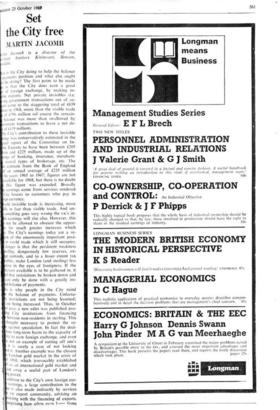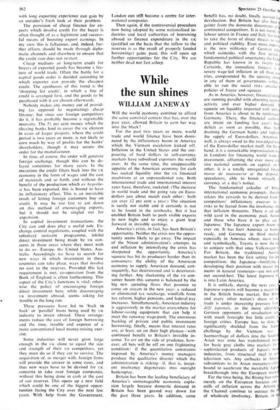Set the City free
MARTIN JACOMB
lucomb is a director of the t.hant bankers Klein won, Benson, sdale.
at k the City doing to help the balance paNments position and what else ought 0 be doing? The first point to be made is that the City does earn a great of foreign exchange, by making in- hie exports. Net private invisibles (i.e. log government transactions out of ac- nil came to the staggering total of £839 an in 1968, more than the visible trade (4. £796 million (of course the remain- balance was more than swallowed by ernment transactions to leave a net de- of £419 million).
he City's contribution to these invisible alas was conservatively estimated in the mal report of the Committee on In- He Exports to have been between £205 ion and £225 million, made up of the Ings of banking, insurance, merchant- several types of brokerage, etc. The t estimate from the Bank of England I an annual average of £235 million the years 1965 to 1967; figures are not .,■ailable for 1968, but there is no doubt this figure was exceeded. Broadly earnings come from services rendered ity houses to customers who pay in gn currency.
orld invisible trade is increasing, more ly in fact than visible trade. And un- something goes very wrong the mc's in- e earnings will rise also. However, this not be allowed to obscure the oppor- for much greater increases which The City's earnings today are a re- on of the enormously important posi- in world trade which it still occupies. danger is that the persistent weakness erling, dangerously low reserves, ex- ,!e controls, and to a lesser extent tax ulties, make London (and sterling) less live in the eyes of foreigners. If the arvest available is to be gathered in. it al that restrictions be broken down and in only be done with a greatly im- d balance of payments.
IN is why people in the City mind 1 the balance of payments. Unfortu- , restrictions are not being lessened; ire being increased. Thus, in October ,1 year, a new edict was published pro- ng City institutions from financing between non-residents in sterling. This thought necessary to protect the re- against speculation. In fact the deci- does long-term harm to the capacity of ty to earn foreign exchange, and even Is not an example of cutting off one's it is surely a case of not looking
d it. Another example was the closure
e London gold market in the crisis of h 1968, which irrevocably established as an international gold market and cut away a useful part of London's g Power.
tddition to the City's own foreign cur- earnings, a large contribution to the is also made indirectly by services UK export community, advising on ssisting with the financing of exports. F Surprising how often even Inm° firms with long exporting experience can gain by an outsider's fresh look at their problem.
The provision of cheap finance for ex- ports which involve credit for the buyer is often thought of as a legitimate and success- ful means of boosting export earnings. In my view this is fallacious, and, indeed, fur- ther efforts should be made through diplo- matic channels and elsewhere to ensure that the credit race does not re-start.
Cheap medium- or long-term credit for buyers of exported goods has become a fea- ture of world trade. Often the battle for a capital goods order is decided according to which exporter can provide the cheapest credit. The apotheosis of this trend is the 'shopping list credit', in which a line of credit is arranged first, and the goods to be purchased with it are chosen afterwards.
Nobody makes any money out of provid- ing (as opposed to negotiating) cheap finance; but since our foreign competitors do it, it has probably become a regrettable necessity. The 51 per cent money which the clearing banks lend to cover the UK element in cases of larger projects, where the credit period is two years or more, is not likely to earn much by way of profits for the banks' shareholders, though it may secure the order for the manufacturer.
In time, of course, the order will generate foreign exchange, though this can be de- layed sometimes for many years. In the meantime the credit filters back into the Inc economy in the form of wages and the cost of materials and so forth, and without the benefit of the production which ex hypothe- si has been exported, this is bound to have its inflationary effect. This is an inevitable result of letting foreign customers buy on credit. It may be too late to cut down on this method of encouraging exports, but it should not be singled out for expansion.
In capital investment transactions, the City can and does play a useful role. Ex- change control regulations, coupled with the voluntary restraint programme, inhibit direct investment being made by UK con- cerns in those areas where they most wish to do so—Europe, the United States, Aus- tralia. Accordingly we have to search for new ways in which investment in these countries can take place, ways that involve no cost to the reserves. Provided this last requirement is met, co-operation from the Bank of England is often forthcoming. This aspect of the City's functions is vital; other- wise the policy of encouraging foreign direct investment here, while discouraging ux investment abroad, seems asking for trouble in the long run.
These pressures have led to 'back to back' or 'parallel' loans being used by UK industry to invest abroad. These arrange- ments reduce the cost of foreign borrowing and the time, trouble and expense of a more conventional local money-raising exer- cise.
Some industries will never grow large enough in the UK alone to equal the size and strength of their us competitors, yet they must do so if they are to survive. The acquisition of, or merger with, foreign firms will provide the answer in some cases, and thus new ways have to be devised for tnc concerns to take over foreign companies, without this being done in cash at the cost of our reserves. This opens up a new field which could be one of the biggest oppor- tunities facing the City over the next few years. With help from the Government, London can still become a centre for inter- national companies.
Then again, if the controversial procedure now being adopted by some nationalised in- dustries and local authorities of borrowing abroad to finance expenditure in the UK (justified on the basis that the inflow to the reserves is as the result of properly funded borrowings) gains pace, this will open up further opportunities for the City. We are neither dead nor fast asleep.



















































 Previous page
Previous page